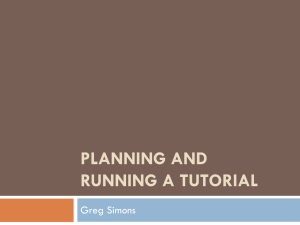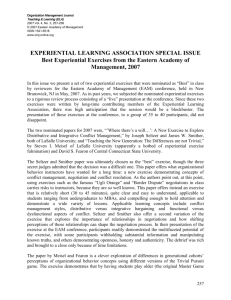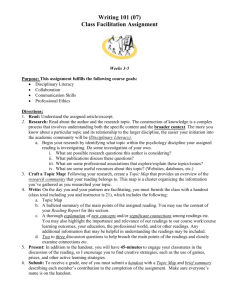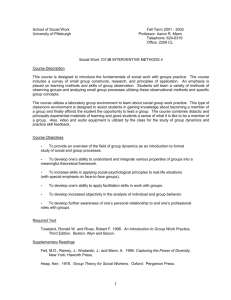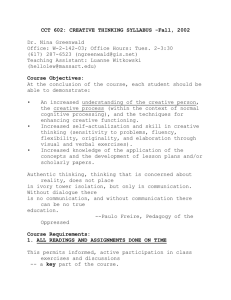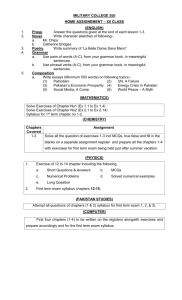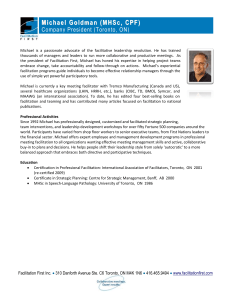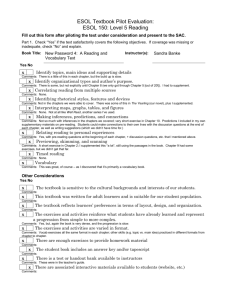Assumption University
advertisement
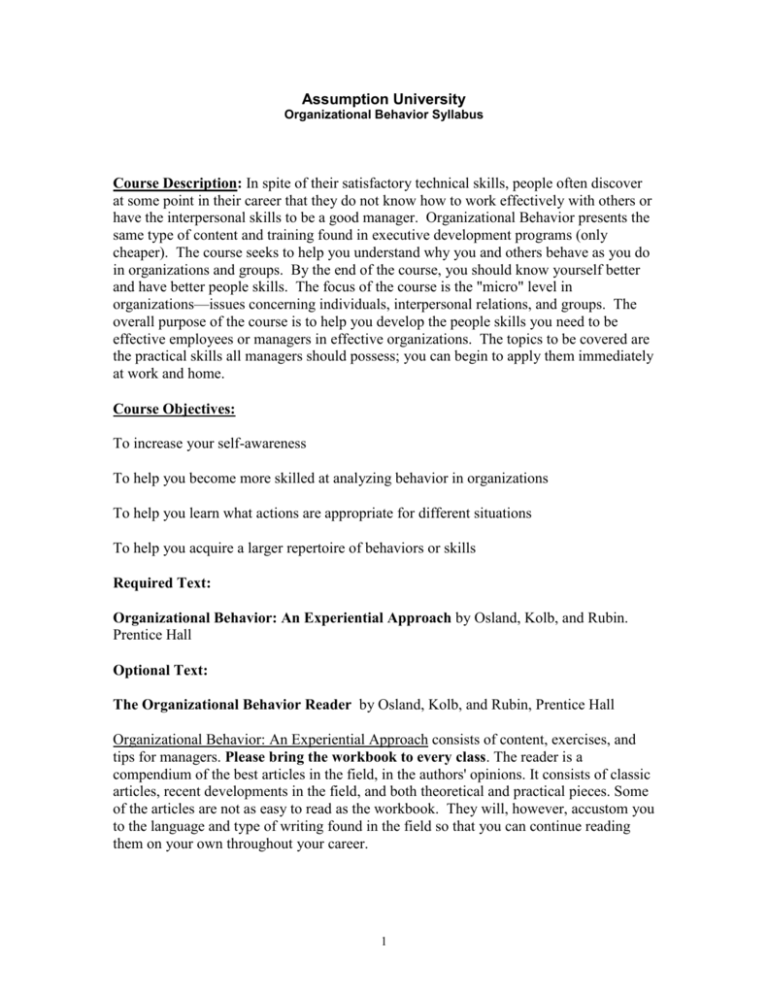
Assumption University Organizational Behavior Syllabus Course Description: In spite of their satisfactory technical skills, people often discover at some point in their career that they do not know how to work effectively with others or have the interpersonal skills to be a good manager. Organizational Behavior presents the same type of content and training found in executive development programs (only cheaper). The course seeks to help you understand why you and others behave as you do in organizations and groups. By the end of the course, you should know yourself better and have better people skills. The focus of the course is the "micro" level in organizations—issues concerning individuals, interpersonal relations, and groups. The overall purpose of the course is to help you develop the people skills you need to be effective employees or managers in effective organizations. The topics to be covered are the practical skills all managers should possess; you can begin to apply them immediately at work and home. Course Objectives: To increase your self-awareness To help you become more skilled at analyzing behavior in organizations To help you learn what actions are appropriate for different situations To help you acquire a larger repertoire of behaviors or skills Required Text: Organizational Behavior: An Experiential Approach by Osland, Kolb, and Rubin. Prentice Hall Optional Text: The Organizational Behavior Reader by Osland, Kolb, and Rubin, Prentice Hall Organizational Behavior: An Experiential Approach consists of content, exercises, and tips for managers. Please bring the workbook to every class. The reader is a compendium of the best articles in the field, in the authors' opinions. It consists of classic articles, recent developments in the field, and both theoretical and practical pieces. Some of the articles are not as easy to read as the workbook. They will, however, accustom you to the language and type of writing found in the field so that you can continue reading them on your own throughout your career. 1 Class Format The most effective method for teaching interpersonal and managerial skills is experiential learning. This means that we will turn the classroom into a laboratory and create conditions for understanding concepts through experience as well as readings. We will use role plays, exercises, and simulations so that you can pull out your own learning points from these experiences. This type of course requires students to take responsibility for their own learning. In order for an experiential course to be successful, students need to do all the reading and homework preparation and participate actively in the classroom. Therefore, attendance is mandatory because what goes on in class is not a repeat of the readings but the heart of the course. If you have an emergency and cannot attend class, please call me beforehand so we can make special arrangements if need be. Please do not underestimate the importance of participation in this course. It is an important part of your final grade, not to mention that it gives you an opportunity to practice your communication skills. You need to learn to speak up sometime; you may as well do it here among friends. If you find it difficult to participate in class, please come see me in the beginning of the course so we have time to remedy the situation. You will receive a packet of self-assessment instruments. The instruments are to help you understand yourself better and are usually filled out prior to class, as indicated on the syllabus (see Packet Homework). Please fill them out carefully and do the scoring before coming to class. The more honestly you answer these instruments, the more accurate a self-portrait you can construct. One of the most important skills in today’s business world is the ability to work effectively in groups. To give you more practice, you will usually work with the same learning group in class and will receive feedback from this group on your performance in the course. First Learning Opportunity TEAM TASK LEARNING: To be an effective systems manager one needs to be adept at working in teams, achieving goals and objectives with and through other people. In addition, people tend to learn more when they are involved in the learning process and when they are called upon to facilitate the learning of others. With these two ideas in mind class members are invited to form a number of management teams. Each team will choose a concept from the Organizational Behavior text, write a paper and facilitate a learning experience in and with the class. 2 Divide the written paper into three chapters: Chapter One 1) Discuss a particular behavioral theory or management concept from the text. Assume other classmates have read the chapter in the text that your team selected. 2) Test the theory based on one's own experience and the experience of others; give examples from your own experience. Do not repeat examples from the text. 3) Decide whether the theory fits your perception of reality. 4) Suggest how to implement the theory in the work place and what challenges to implementation need to be considered. This fourth part is the most important part of Chapter One. Chapter Two Describe how the learning team practiced the ideas in the chapter as the team went about working, planning and executing the report and the facilitation. Focus on the PROCESS. Chapter Three Each member of the team indicates how he/she will change his/her own behavior based on the experience, the learning. A report of approximately 10 to 12 pages is written covering the above issues in three chapters and submitted before the facilitation with copies for each participant so the class members can read your report as well as the chapter before it is experienced. Indicate the sources the team consulted in a complete bibliography. The second and third chapters are most important and each is expected to be at least the same length as the first chapter if not longer. The objective of the facilitation is not merely to report data ( a one-way communication model, but to facilitate a process by which the whole class becomes involved in the learning experience. High grades will be given teams who best get the class involved. Be creative. Assume the class has read your paper and the chapter. Do not repeat the material in the facilitation and do not read your report. Rather, facilitate a process by which your fellows students discover and understand the material. In the first sessions I will seek to model the methodology for facilitating the learning experience. Second Learning Opportunity Your team is to interview at least 40 employees as to what motivates them. Really question each worker to better understand his or her motivation and attitude towards work. Note how their responses relate to concepts discussed in Chapter 4 in both texts. The team then analyzes the 40 responses and suggests strategies for influencing the motivation of employees in a paper of 5 or 6 pages. Be prepared to present your findings to the class. Give each team a copy of your report. 3 Third Learning Opportunity Your team is to find a work group/organization that will allow you to observe people at work and talk to them about their jobs. Using information from Chapter 19 and 20 in both texts, redesign their workgroup's jobs for the purpose of increasing performance and intrinsic motivation. Return to the workgroup and share your new design with both the workers and the supervisor separately and be attentive to their feedback. Capture the learning from this entire experience in a paper of about 5 - 6 pages due and be prepared to present your findings to the class. Criteria for Evaluation Team Paper 20% Team Facilitation 20% Team Motivation Paper & Presentation 20% Team Job Redesign Paper & Presentation 20% Individual Papers and Participation 20% Total 100% A+ = 98 - 100 B = 84 - 87 A = 94 - 97 B- = 80 - 83 A- = 90 - 93 C+ = 78 - 79 B+ = 88 - 89 etc. Class contribution (attendance, preparation & participation) Each student is expected to be an active participant in each class session and take part in the exercises and make meaningful comments on both the readings and the experiences in the classroom. I value quality rather than quantity— talking for the sake of talking does not improve your class contribution grade. I am looking for evidence of good critical thinking on your part: getting to the nub of an article, asking thought-provoking questions, coming up with learning points 4 from our experiences in class, and sharing what you have learned about yourself and others during the exercises. Another aspect of participation is how well you help your learning group accomplish the tasks and exercises assigned both during and outside class. Merely coming to class is not sufficient; attendance is a first step, but you must also participate actively. 5

